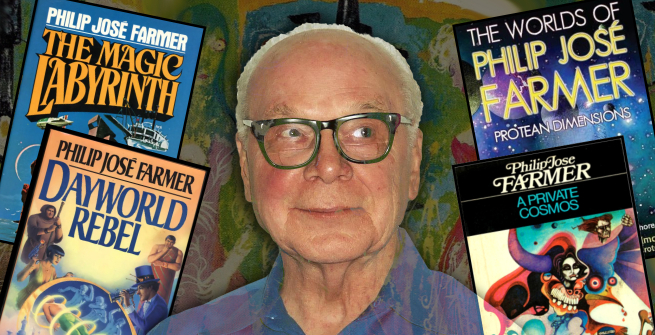Imagine a world where diverse fictional characters such as Tarzan, Sherlock Holmes, and James Bond were all interrelated. That’s how Philip Jose Farmer and his Wold Newton Universe imagined things. Farmer, born January 26, 1918, and died in 2009, was a visionary science fiction author who dabbled in multiple genres ranging from traditional science fiction to comprehensive literary biographies of pulp characters like Doc Savage and Tarzan to more adult-oriented novels and satire.
The writer still enjoys a following among science fiction readers who gather every year in Pittsburgh, Pennsylvania, at FarmerCon, a smaller convention within the larger convention called PulpFest. We caught up with author Win Scott Eckert, who has continued with Farmer’s work writing novels within the Wold-Newton Universe.
What should first-time readers know and expect when first reading Philip José Farmer?
First-time readers will likely be impressed with the sheer diversity and breadth of Philip José Farmer’s ideas. He was always trying something new. First instance, he was the first SF writer to introduce human-alien species sexual relations and to deal with that topic in a serious way (The Lovers).
Farmer’s award-winning Riverworld series is audacious in its scope, and his World of Tiers series is highly imaginative as well as action-packed.
In the early seventies, Farmer went through a phase of a few novels that were shocking to the sensibilities of some readers, although, in reality, they were satirizing various tropes. Brand new readers might not want to start with these books (A Feast Unknown, Image of the Beast, and Blown)—although they are quite excellent.
What is the Wold Newton Universe?
The Wold Newton family is a literary concept derived from a form of crossover fiction developed by Philip José Farmer.
In real life, a meteorite called the Wold Cottage meteorite fell near Wold Newton, Yorkshire, England, on December 13, 1795.
Farmer suggested in two fictional biographies, Tarzan Alive: A Definitive Biography of Lord Greystoke (1972) and Doc Savage: His Apocalyptic Life (1973), that this meteorite caused genetic mutations in the occupants of two passing coaches due to ionization. Many of their descendants were thus endowed with extremely high intelligence and strength, as well as an exceptional capacity and drive to perform good or, as the case may be evil deeds. The progeny of these travelers were the real-life progenitors of fictionalized characters, both heroic and villainous, over the last few hundred years.
As well as Tarzan and Doc Savage, both Lord Peter Wimsey and Sherlock Holmes are descendants of the original families. Other popular characters included by Farmer as members of the Wold Newton family are Solomon Kane; Captain Blood; The Scarlet Pimpernel; Sherlock Holmes and his nemesis Professor Moriarty; Phileas Fogg; The Time Traveler (main character of The Time Machine by H. G. Wells); Allan Quatermain; A. J. Raffles; Professor Challenger; Richard Hannay; Lord Peter Wimsey, Bulldog Drummond; the evil Fu Manchu and his adversary, Sir Denis Nayland Smith; G-8; The Shadow; Sam Spade; Doc Savage's cousin Patricia Savage and one of his five assistants, Monk Mayfair; The Spider; Nero Wolfe; Mr. Moto; The Avenger; Philip Marlowe; James Bond; Lew Archer; Travis McGee; Monsieur Lecoq; and Arsène Lupin.
Characters incorporated into the WNU are not necessarily blood relatives, descendants, or ancestors of the coach travelers present at the 1795 Wold Cottage meteor strike, but these characters all exist in the same shared fictional universe. Farmer himself penned a number of stories and novels set in what is now termed the Wold Newton Universe; not all characters in Farmer's Wold Newton fiction are core members of the Wold Newton Family, but all are linked into the larger WNU via connections with Farmer's primary Wold Newton Family works, Tarzan Alive and Doc Savage: His Apocalyptic Life.
What happens at PulpFest/FarmerCon?
PulpFest has been held annually for over fifty years at various locations in Ohio and Pennsylvania. Dealers come with pulp magazines, vintage paperbacks, and collectible hardcovers (along with some comics and original art, although these are not the primary focus).
Since 2011, FarmerCon has been a smaller "con within a con" at PulpFest. The first three FarmerCons were held at Phil and Bette Farmer’s home in Peoria in the summers of 2006, 2007, and 2008. Phil and Bette both passed away in 2009. In 2010, we experimented with holding FarmerCon in Seattle in conjunction with the SF Hall of Fame, and then in 2011, we partnered with PulpFest.
FarmerCon is a small gathering and mostly informal. Anyone who is a Farmer fan can come and just pay the PulpFest badge fee. We hold one or two discussion panels at each Con and have informal dinners at local restaurants. The small publisher Meteor House, which puts out a lot of Farmer-related material, has a table at PulpFest/FarmerCon every year. In the evenings, we all gather in the hotel lobby (when we are not attending other panels) and discuss Farmer, his works, and anything else of interest, such as movies, pulps, comics, writing, and so on. At its heart, FarmerCon is simply an annual gathering of good friends.
What do you think is Farmer's literary legacy?
I believe Farmer’s literary legacy will always be one of breaking barriers: the sex taboo in SF; adult themes treated with seriousness (and yet also with a twinkle in his eye) in many of his books; his willingness to write about religion in SF (Jesus on Mars), and his innovative combining of many popular characters from literature and adventure fiction into a universe which influenced many other works such as Alan Moore’s League of Extraordinary Gentlemen and Kim Newman’s Anno Dracula series.
Here are this blogger’s picks for the best of Philip Jose Farmer.





